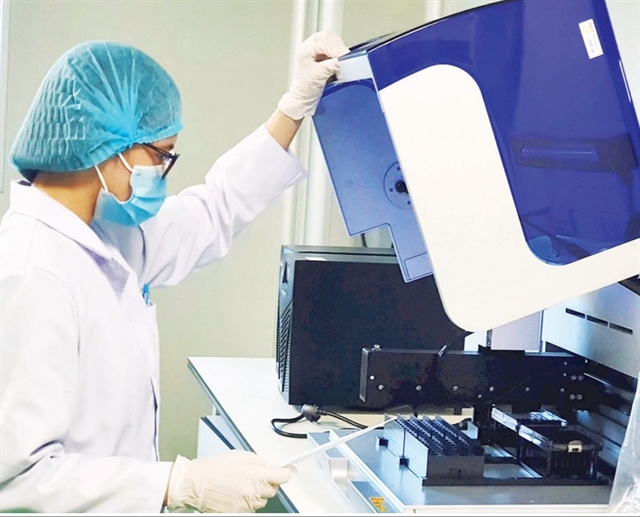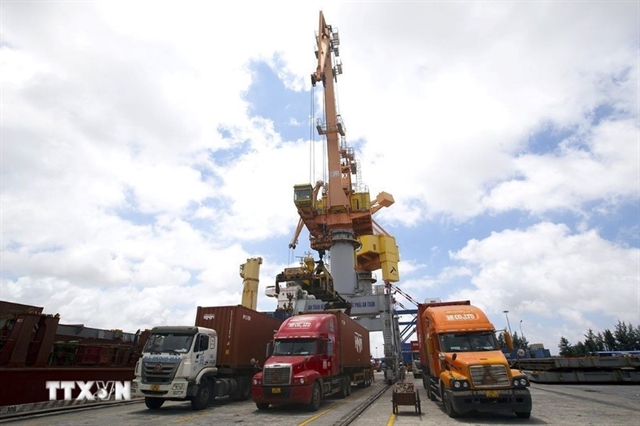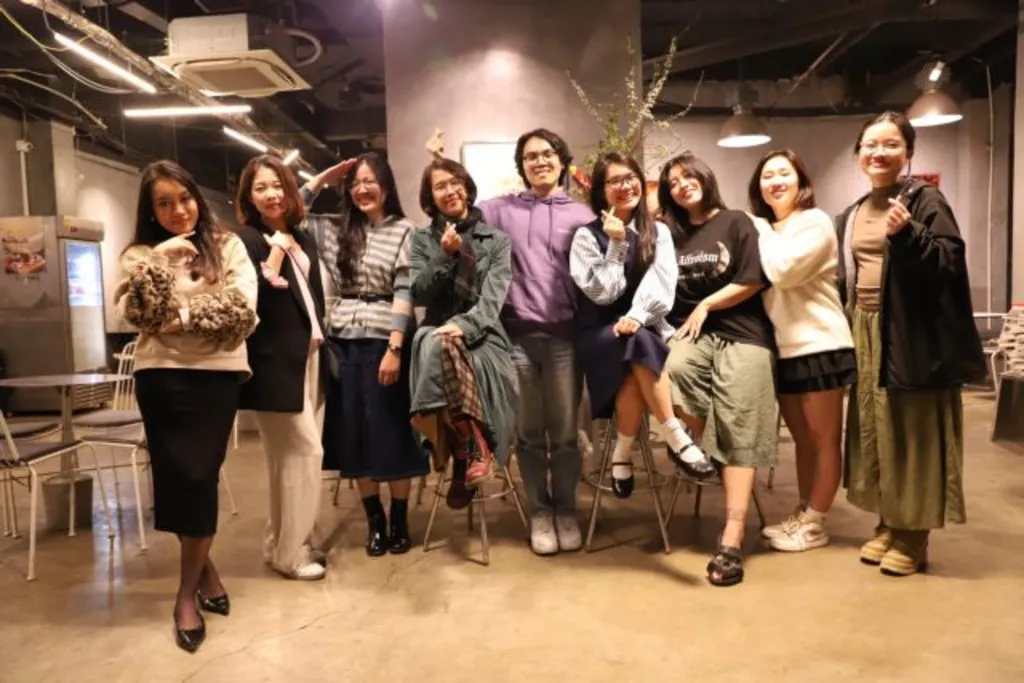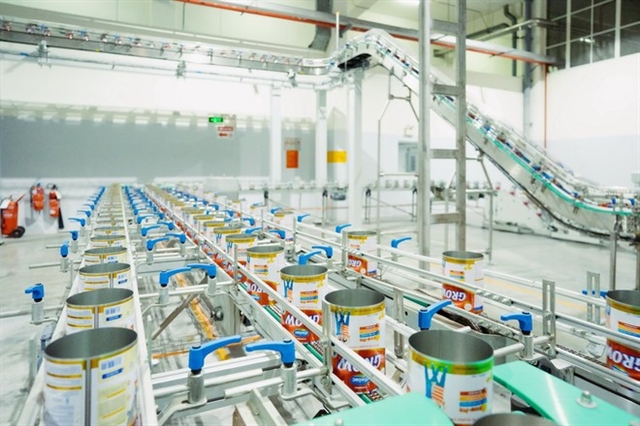 Society
Society

 |
| Diệu Anh aims to develop PsyCancer Talk into a fully-fledged, integrated centre for free mental health support, specifically tailored to the needs of the cancer-affected community and other marginalised groups. — Photo courtesy of PsyCancer Talk |
Linh Anh
HÀ NỘI In the tranquil atmosphere of a quaint wooden-detailed vegan restaurant, a group of young girls were gleefully enjoying their jovial chatter. But their babbling came to an abrupt halt when Diệu Anh received a video call for a meeting she had previously arranged.
She excused herself politely and walked to the lobby, swiftly powered on her computer to join the meeting with her teammates. Just beyond wide windows by her side, festoon lights were hung over the streets on New Year's Day. Their glow mingled with the headlights of occasional passing cars, shimmering over the vibrant traffic of Hà Nội by night. But Diệu Anh was so immersed in her pressing call that she took no note of her surroundings.
Diệu Anh and her team have started an initiative which provides counselling and psychological support to individuals battling cancer, who might need their aid at any given moment.
Non-profit PsyCancer Talk Initiative, developed by Diệu Anh and four other dedicated members since October 2022, provides individual counselling and customised psychotherapies to cancer patients, who not only endure physical pain but also grapple with mental anguish.
The reach of PsyCancer Talk has expanded significantly, with a total of 28 individuals now actively engaged in this initiative.
“Each newly diagnosed cancer patient would feel and react differently. Some of our clients told us that they felt bewildered when they learned they had an incurable disease. Some reported feelings of fear and worry, stress and anxiety. They also faced anger and loneliness,” Diệu Anh told Việt Nam News.
But somewhere along the way, according to Diệu Anh, there is an unspoken attitude that mental or emotional pain is expected and obvious for the terminally ill, and their complaints with regard to mental well-being are often dismissed and deemed bothersome. This stigma and lack of empathy continue to create barriers in seeking emergency mental health attention.
“Some of our clients seemed to grapple with self-doubt because they were afraid that they would be judged for having both cancer and psychological distress. We received emails from patients even asking whether they should seek support or not. They were uncertain and questioning their own needs,” she said.
A recent study by The National K (Cancer) Hospital has yielded some alarming findings. One in three cancer patients in Việt Nam suffers from psychological disorders and requires aid and intervention.
The study involved more than 300 cancer patients from various departments, namely medication, chemotherapy, radiation therapy, surgery and palliative care. It revealed that a staggering 70 per cent of cancer patients exhibited signs of psychological distress. These individuals were in need of assistance, counselling and treatment to ease their emotional strain.
Among the surveyed patients, nearly 40 per cent experienced depression, with almost half of them at severe or extremely severe levels, posing a potential risk of suicide. Roughly 30 per cent suffered from anxiety disorders, indicating the need for early intervention and support.
 |
| Diệu Anh and other members of Non-profit PsyCancer Talk Initiative, developed in October 2022, which provides individual counselling and customised psychotherapy to cancer patients. — Photo courtesy of PsyCancer Talk |
Not only the patients
The psychological distress brought on by cancer is not only significant and prevalent for cancer patients. This impact is also felt by caregivers and healthcare professionals, who provide care and support to the patients throughout the journey.
“Not only the patients, but their loved ones also suffer,” said Diệu Anh, who has been burdened with immense stress that comes from watching her father struggling with the terminal disease for 12 years.
Grief toppled Diệu Anh after her father passed away last year because of lung cancer. It’s been the most heart-wrenchingly painful, confusing year for her, but it has also been a hugely transformative one. She was devastated and went astray, but even after adversity, she didn’t back away from her commitment.
“I was afraid that I wouldn't be able to overcome my own challenging emotions to continue assisting other cancer patients after my father's passing. But I made a choice. I would not cease my efforts because PsyCancer Talk holds a personal ‘mission’ for me: to preserve and share my father's invaluable knowledge for living a healthy life despite his illness,” she said.
“I am inspired by the ‘Four Strategy’ being the trump card for my father's journey of living with cancer: Medicine, Food, Exercise, and, most importantly, Mindset. This approach helped my father fight against lung cancer for virtually 12 years,” she said proudly.
As a caregiver, she did experience exhaustion, stress and a sense of loss. As a counsellor, she sometimes faces fatigue and worries.
“I constantly ponder how to provide proper support to patients. I try to find the best ways to communicate with them and how to become a good companion,” said Diệu Anh.
“Fortunately, my knowledge gained from psychological learning has helped me cope with these challenging emotions in a healthy way. With the lessons and insights I have gained, I always promise myself to pay it forward. I hope that many others can also enjoy a higher quality of life, with less or no burdensome worries.”
The exposure to the research environment on mental health has helped Diệu Anh direct the implementation of PsyCancer Talk's activities towards an evidence-based and interdisciplinary approach, she said.
She previously participated in the Southeast Asian Mental Health Initiative (SEAMHI), an initiative that aims to foster collaboration in mental health education and training in the region.
SEAMHI, initiated by Dr. Kathy Trang from Harvard University, brings together early career researchers, practitioners and community leaders working in the mental health and psychosocial support (MHPSS) fields in Cambodia, Myanmar and Việt Nam.
“After participating in SEAMHI, I recognised the importance of interdisciplinary approaches when developing psychological solutions for cancer patients. These initiatives can hardly be carried out by one team of psychological practitioners alone, but require the collaboration of various fields, including physical healthcare, social work, policy development, public health, project management, private sector involvement, academia and more,” Diệu Anh said.
“Therefore, when seeking core members for PsyCancer Talk, I have not only looked for individuals with a psychology background. Instead, our team consists of a diverse group of professionals, including doctors, nurses, artists, communication specialists, public health experts, journalists, researchers and others.”
Diệu Anh has also been involved in supporting the Self-help Plus Research Project, which is a group-based stress management course specifically designed for breast and cervical cancer patients in Việt Nam.
“Through this course, I have noticed the importance of focusing on task-sharing mental health interventions for vulnerable communities. This approach is a perfect fit for the specific context of developing countries such as Việt Nam and has inspired me to further develop group-based therapeutic solutions.”
Scholarship paves the way
Years of working in the field have equipped her rich mental health treatment capacity, but hands-on experience also enlightened her to the fact that academic excellence is key to apply her conviction to make sector-wide impact.
To further upscale PsyCancer Talk and develop more comprehensive support programmes, Diệu Anh believed that she needs to enrich her knowledge and skills. She decided to apply for a fully-funded master course in Clinical Mental Health Counselling, aided by Fulbright Scholarship Programme from the US government.
The constrained number of scholarship recipients annually adds an air of prestige to the application process, yet making it incredibly daunting. However, Diệu Anh set aside all dread and anxiety and grabbed this opportunity with both hands. She determined to conquer the obstacle with tenacity and the stubborn refusal to give up.
The accumulative advantages soon compounded, and she was proud to be selected as a recipient for the 2024-25 academic year. The Fulbright scholarship, with its esteemed support, will equip Diệu Anh with in-depth knowledge and skills she needs to realise her career aspirations.
“My objective upon completion of the post-graduate period is to develop PsyCancer Talk into a fully-fledged, integrated centre for free mental health support, specifically tailored to the needs of the cancer-affected community and other marginalised groups. PsyCancer Talk will serve as a career hub, connecting networks and driving the establishment of a new specialised field in psychology in Việt Nam: psycho-oncology.”
One of Diệu Anh’s clients, Hà Trang Vân, initially fell into despair when given her diagnosis of aggressive cancer, but after enrolling in the counselling programme, she realised, “Seeking early support right after receiving the distressing news was the wisest decision I have ever made.”
“I needed guidance, someone to lend an ear, and offer solace, which I can’t expect from my loved ones because they were also grappling with their own confusion.”
“Even the healthiest person would fall into a state of shock when receiving diagnosis. The mental well-being directly influences, and even determines, the physical well-being of cancer patients.”
This realisation ultimately brought Vân, and many of Diệu Anh’s other patients, some measure of peace and consolation as they faced the life's harrowing challenge. And Diệu Anh, in seeking a path for her own future, is striving to renew hope for the future of others. — VNS




